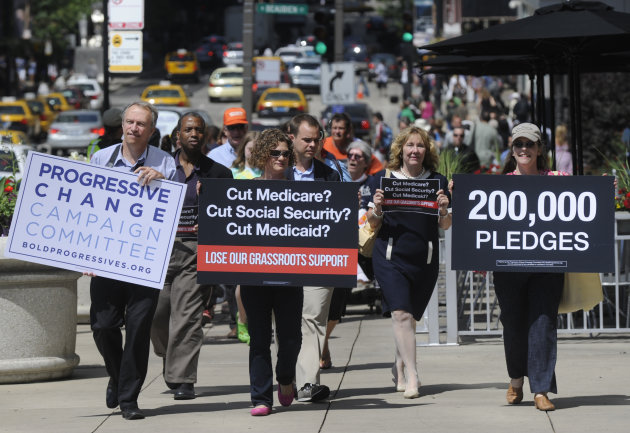
The issue:
As the population gets older, Social Security, Medicare and Medicaid are eating up more and more of the federal budget, squeezing the ability of the government to pay for other programs. Today, the three massive benefit programs account for 44 percent of federal spending. Left unchanged, they will account for more than 60 percent in 25 years, according to the Congressional Budget Office.
Unless Congress acts, the trust fund that supports Social Security is projected to run out of money in 2033. At that point, the retirement and disability program would collect only enough in payroll taxes to pay about 75 percent of benefits.
Medicare’s hospital insurance fund is in worse shape. It is projected to run out of money in 2024. At that point, it would only be able to pay 87 percent of costs, according to projections by the trustees who oversee Medicare and Social Security.
___
The campaign promise:
Obama rarely mentioned Social Security during his 2012 re-election campaign. Four years earlier, he was more forthcoming.
In a 2008 speech to AARP: “John McCain’s campaign has suggested that the best answer for the growing pressures on Social Security might be to cut cost-of-living adjustments or raise the retirement age. Let me be clear: I will not do either.”
On Medicare, Obama told the Democratic convention on Sept. 6, 2012: “Yes, we will reform and strengthen Medicare for the long haul, but we’ll do it by reducing the cost of health care, not by asking seniors to pay thousands of dollars more.”
___
The prospects:
Obama has already offered to break part of his 2008 pledge on Social Security. Twice in negotiations with GOP leaders, he agreed to adopt a new measure of inflation that would result in smaller cost-of-living adjustments, or COLAs, for Social Security recipients. Both deals fell apart. But now Obama has put forward the idea in his own proposed federal budget. If adopted, it would gradually trim benefit increases in Social Security, Medicare and other programs while raising taxes.
His proposed changes, once phased in, would mean a cut in Social Security benefits of nearly $1,000 a year for an average 85-year-old, $560 for a 75-year-old and $136 for a 65-year-old.
Obama and Republican leaders in Congress have held off-and-on talks about possible changes to entitlement programs since 2011, as part of their efforts to reduce government borrowing. But a deal remains elusive. Republicans insist any agreement must include deep spending cuts, while Obama says any deal must include more tax revenue. And many Democrats in Congress are protective of the entitlement programs that Obama now is willing to touch.
—-
Click below for the full article.
http://news.yahoo.com/promises-promises-social-security-pledge-173052710.html

